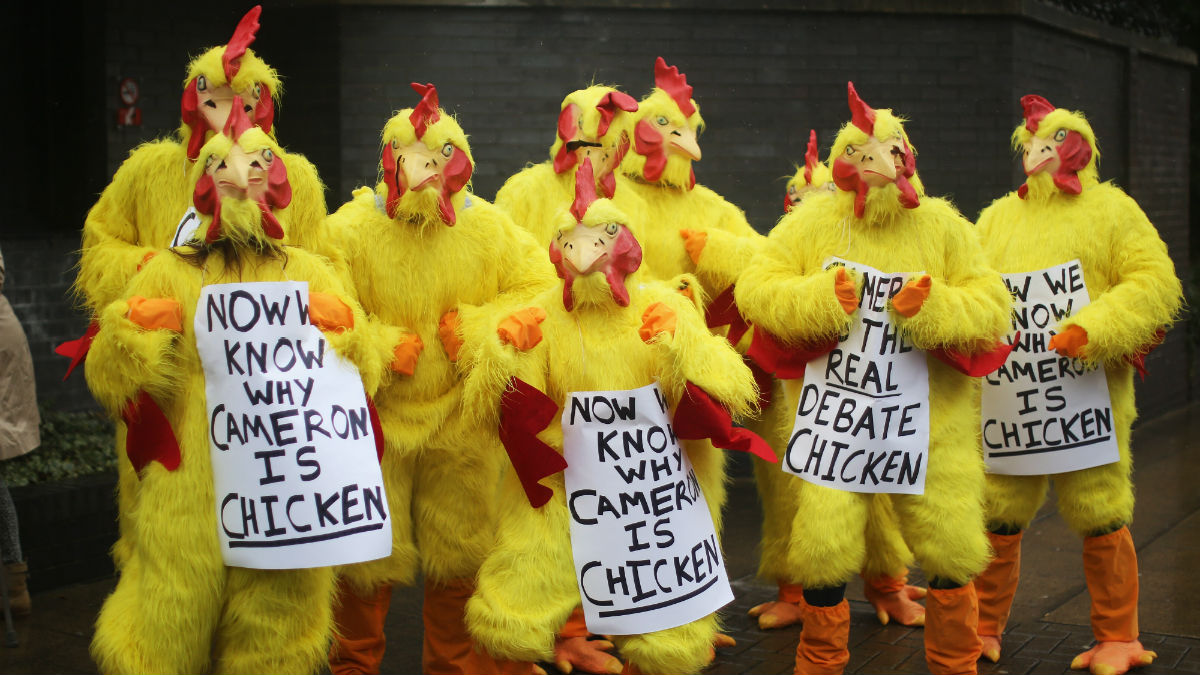General election: Labour spent £600 on chicken suits
Electoral Commission reveals costs of parties' campaigns, with Tories targeting Facebook ads to win over voters

A free daily email with the biggest news stories of the day – and the best features from TheWeek.com
You are now subscribed
Your newsletter sign-up was successful
Labour spent almost £600 on fancy dress chicken suits during last year's general election campaign, according to new figures released by the Electoral Commission.
The party has a "track record" of using the costumes in its campaigns, says The Independent, after paying someone to wear one and chase London Mayor Boris Johnson down the street in 2012.
However, a breakdown of party spending in the run-up to May's election shows the Conservatives spent the most during the campaign, coming in at £15.5m, compared to Labour's £12m.
The Week
Escape your echo chamber. Get the facts behind the news, plus analysis from multiple perspectives.

Sign up for The Week's Free Newsletters
From our morning news briefing to a weekly Good News Newsletter, get the best of The Week delivered directly to your inbox.
From our morning news briefing to a weekly Good News Newsletter, get the best of The Week delivered directly to your inbox.
Media blog Guido Fawkes reports that 15 per cent of total Tory expenditure – some £2.4m - went straight to the communications company of their chief political strategist Lynton Crosby, who later received an honorary knighthood for his services in the New Year's honours list.
Ukip spent money most efficiently, paying out an average of 73p per vote, compared to £1.46 per vote spent by the Lib Dems.
The greatest differential in spending came in unregulated digital advertising, with the Conservatives spending £1.2m on Facebook ads while Labour spent just £16,455.
Conservative Party strategists have said it was targeting the social media site that enabled them to win key marginal seats.
A free daily email with the biggest news stories of the day – and the best features from TheWeek.com
"We tested everything: display advertising, Google AdWords, Facebook - we found unequivocally that Facebook was the easiest way to reach the people we wanted to reach in the places we wanted to reach them," chief digital strategist Craig Elder told Buzzfeed News.
He added that Twitter mainly appealed to journalists and people already engaged with politics who were unlikely to change their minds.
"Last time [2010], everyone talked about how it was the first social-media election," he said. "This time around, it actually was and no one noticed."
An internal report on the causes of Labour's election defeat released earlier this month exonerated its campaign and instead focussed on issues of economic credibility and competence.
-
 Political cartoons for February 15
Political cartoons for February 15Cartoons Sunday's political cartoons include political ventriloquism, Europe in the middle, and more
-
 The broken water companies failing England and Wales
The broken water companies failing England and WalesExplainer With rising bills, deteriorating river health and a lack of investment, regulators face an uphill battle to stabilise the industry
-
 A thrilling foodie city in northern Japan
A thrilling foodie city in northern JapanThe Week Recommends The food scene here is ‘unspoilt’ and ‘fun’
-
 How corrupt is the UK?
How corrupt is the UK?The Explainer Decline in standards ‘risks becoming a defining feature of our political culture’ as Britain falls to lowest ever score on global index
-
 The Mandelson files: Labour Svengali’s parting gift to Starmer
The Mandelson files: Labour Svengali’s parting gift to StarmerThe Explainer Texts and emails about Mandelson’s appointment as US ambassador could fuel biggest political scandal ‘for a generation’
-
 Reforming the House of Lords
Reforming the House of LordsThe Explainer Keir Starmer’s government regards reform of the House of Lords as ‘long overdue and essential’
-
 How long can Keir Starmer last as Labour leader?
How long can Keir Starmer last as Labour leader?Today's Big Question Pathway to a coup ‘still unclear’ even as potential challengers begin manoeuvring into position
-
 Three consequences from the Jenrick defection
Three consequences from the Jenrick defectionThe Explainer Both Kemi Badenoch and Nigel Farage may claim victory, but Jenrick’s move has ‘all-but ended the chances of any deal to unite the British right’
-
 The high street: Britain’s next political battleground?
The high street: Britain’s next political battleground?In the Spotlight Mass closure of shops and influx of organised crime are fuelling voter anger, and offer an opening for Reform UK
-
 The MAGA civil war takes center stage at the Turning Point USA conference
The MAGA civil war takes center stage at the Turning Point USA conferenceIN THE SPOTLIGHT ‘Americafest 2025’ was a who’s who of right-wing heavyweights eager to settle scores and lay claim to the future of MAGA
-
 Is a Reform-Tory pact becoming more likely?
Is a Reform-Tory pact becoming more likely?Today’s Big Question Nigel Farage’s party is ahead in the polls but still falls well short of a Commons majority, while Conservatives are still losing MPs to Reform